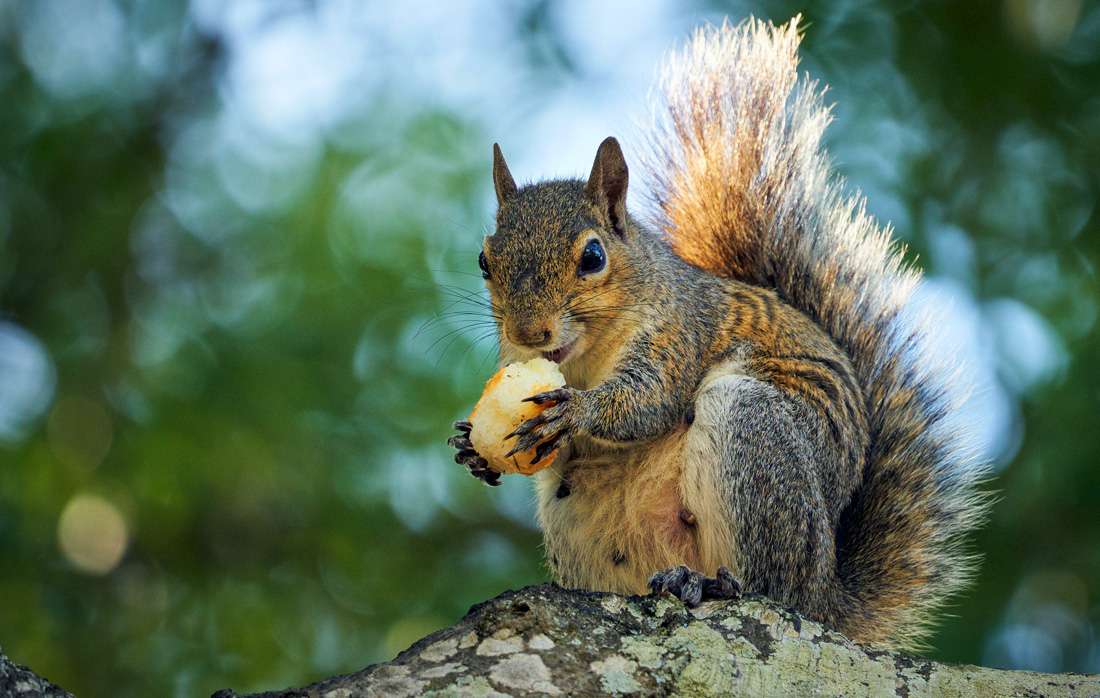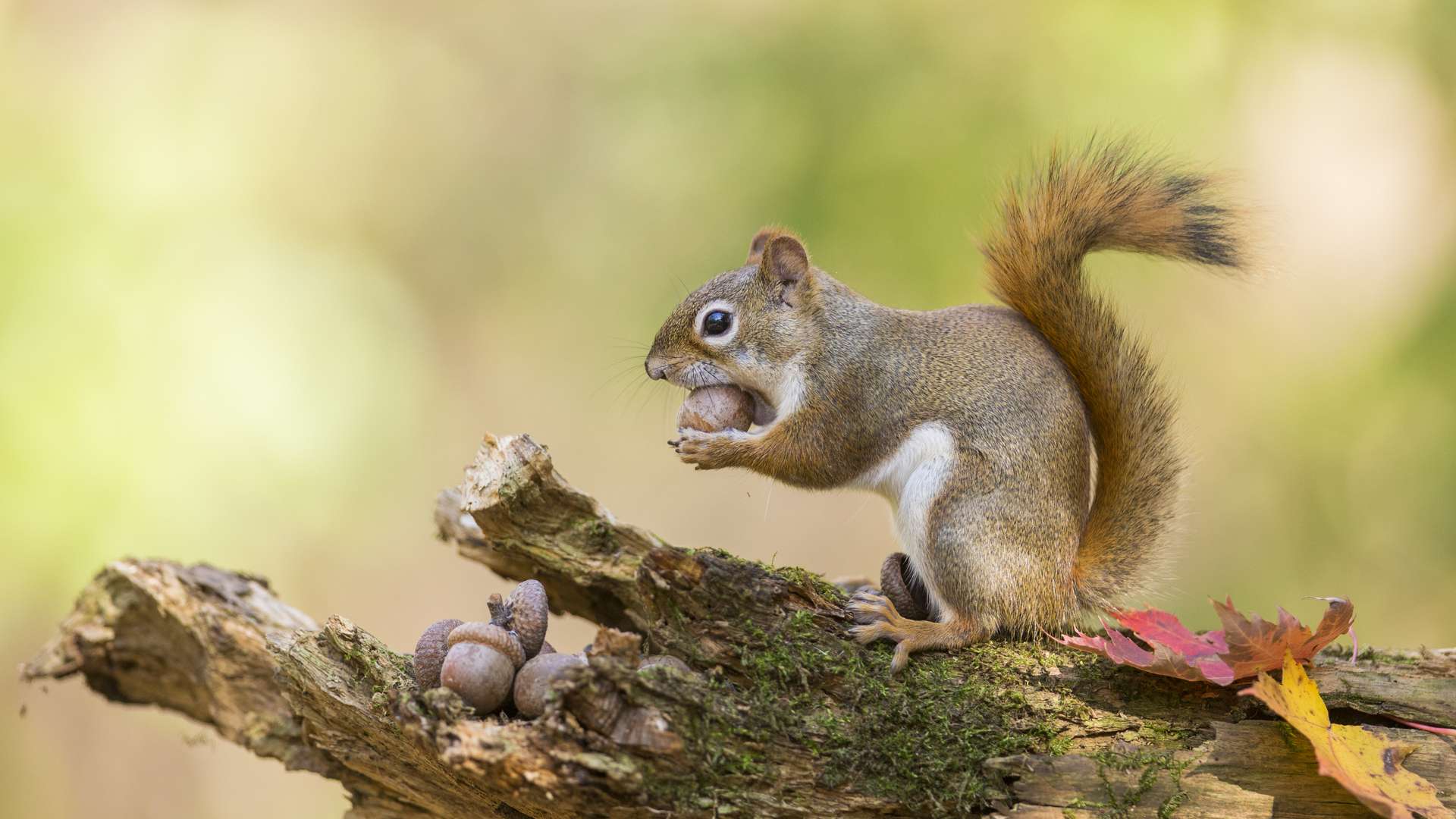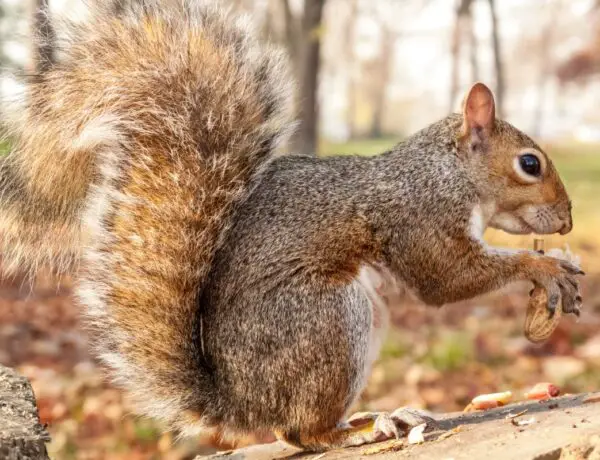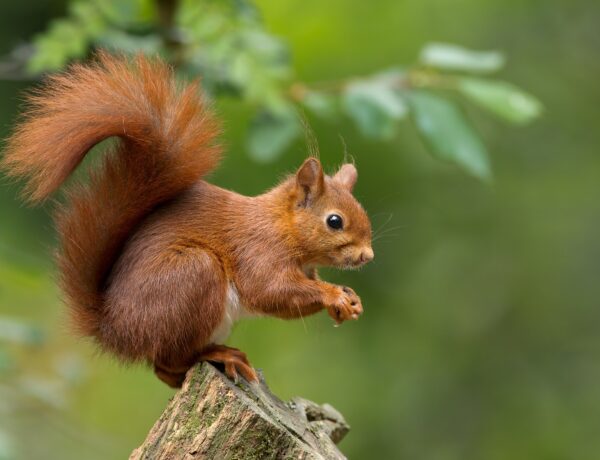Introduction
What Do Squirrels Eat In The Wild: Squirrels, those agile and acrobatic creatures that captivate our attention with their boundless energy and nimble antics, are a common sight in many parts of the world. These small mammals, belonging to the family Sciuridae, have adapted exceptionally well to diverse environments, from urban parks to dense forests. One of the most intriguing aspects of squirrels is their diet, a topic that piques the curiosity of both nature enthusiasts and scientists alike. Squirrels litter are omnivores, meaning they have a diverse diet that can include a wide range of food items. However, their preferences can vary depending on their species, habitat, and the season.
Squirrels consume a mixture of plant-based and animal-based foods, making them opportunistic feeders. The ability to adapt their diet based on what’s available in their surroundings is one of the key factors contributing to their survival in various ecosystems. A significant portion of a squirrel’s diet consists of nuts, seeds, and fruits. These small rodents are renowned for their ability to forage and store nuts like acorns, walnuts, and hazelnuts. Their strong jaws and sharp incisors allow them to crack open the hard shells of these treasures. Squirrels often bury nuts and seeds in the ground, which serves as a natural storage system.
They rely on their remarkable memory and keen sense of smell to locate these hidden caches during the lean winter months when food is scarce. Beyond the realm of plants, squirrels also incorporate insects, bird eggs, and even fungi into their diet. Insects and larvae squirrels with essential protein, while bird eggs and mushrooms offer a change of taste and added nutrients. These occasional animal-based food sources help supplement their diet when plant-based options are limited. To truly understand the dietary habits of squirrels in the wild, we must explore the intriguing interplay between their food choices and their environments.

What is a squirrel’s favorite food?
Squirrels’ favorite natural foods are hickory nuts, pecans, black walnuts, and acorns. Their favorite feeder food is black oil sunflower seeds, their least favorite feeder food is Nyjer® (thistle) seed.
Nuts: Perhaps the most iconic food associated with squirrels, nuts are undoubtedly a favorite. Squirrels are well-equipped with sharp incisors that allow them to crack open the hard shells of nuts like acorns, walnuts, and hickory nuts. They are particularly fond of acorns, which they often gather and store for the winter months when food is scarce.
Seeds: Seeds from various plants are another staple in a squirrel’s diet. Sunflower seeds, in particular, are favored by many squirrel species. These seeds are readily available in bird feeders, making them a common target for urban squirrels looking for an easy meal.
Fruits: Squirrels have a sweet tooth for fruits, especially when they are ripe and in season. Apples, berries, cherries, and even citrus fruits are relished by these rodents. Their love for fruit makes them occasional visitors to orchards and gardens.
Vegetables: Squirrels are not entirely vegetarian and will occasionally munch on vegetables like corn, peas, and even garden greens. Their fondness for these vegetables can sometimes lead to conflicts with gardeners and farmers.
Can squirrels eat bread?
Bread products contain very little nutritional value for wildlife. In fact, they can be full of sugars, sodium and carbohydrates. Sadly, these ingredients can be deadly to birds, squirrels, fish and many other animals that are not equipped to digest this unnatural diet.
Nutritional Value: While bread can energy, it lacks the essential nutrients that squirrels need for their overall health. Squirrels have a varied diet in the wild, consisting of nuts, seeds, fruits, and even insects. These foods are a more balanced diet with protein, healthy fats, and vitamins. Feeding squirrels primarily bread can lead to nutritional deficiencies over time.
Digestive Health: Bread is not a natural part of a squirrel’s diet. It can be challenging for them to digest, especially in large quantities. Squirrels have a delicate digestive system, and consuming too much bread can lead to digestive issues like bloating and diarrhea.
Impact on Dental Health: Bread is soft and does not require the same level of chewing as nuts and seeds. Chewing on harder, natural foods helps keep a squirrel’s teeth healthy and sharp. A diet high in soft foods like bread can contribute to dental problems.
Do squirrels eat bird?
Want a short and succinct answer? Yes, squirrels will eat birds. Squirrels, like many mammals, are opportunistic omnivores. This means that squirrels typically only eat plant matter, but when presented with the opportunity to get vitamins, minerals, and animal proteins, will take advantage of a vulnerable animal.
Nesting Material: Squirrels might take advantage of abandoned bird nests or use bird nests as a source of nesting material. They may dismantle bird nests to collect twigs, leaves, and other materials for building their own nests, especially during the breeding season.
Competition for Food: In squirrels and birds may compete for the same food sources, such as bird feeders filled with seeds or suet. Squirrels are known for their agility and may attempt to access bird feeders, which can lead to conflicts with birds and frustration for bird enthusiasts.
Predatory Behavior: While squirrels are not natural predators of birds, there have been rare instances of squirrels capturing and consuming small birds, especially young and vulnerable ones. Such cases are relatively uncommon and may occur due to unusual circumstances or scarcity of other food sources.
Is it good to feed squirrel?
Wildlife Services encourages you to avoid feeding wildlife such as ducks, geese, gulls, raccoons, deer, squirrels or coyotes. One way you can help reduce wildlife conflicts with people is by not feeding wildlife near human populations and in parks.
Connection to Nature: Feeding squirrels can an opportunity for people, especially in urban areas, to connect with and appreciate wildlife. It can be a delightful experience for individuals, families, and children to observe these agile creatures up close.
Education: Feeding squirrels can serve as an educational tool, teaching people about the behavior, habits, and diet of these small mammals. It can foster an understanding of the natural world and the of conservation.
Support in Harsh Seasons: During harsh winter months or droughts, when natural food sources are scarce, providing supplementary food to squirrels can help them survive. It’s essential to be mindful of their needs during such times.
Research Opportunities: Observing and feeding squirrels in your area can contribute to citizen science efforts and research on local wildlife populations. It can help researchers gather valuable data on squirrel behavior and distribution.
What is the Speciality of squirrel?
Characteristics of Squirrel
The tree squirrel, unlike the other mammals, descends a tree head first, they do so by rotating their ankles almost 180 degrees. Squirrels can live in almost every habitat, from Tropical rainforests and deserts to higher polar regions.
Agility and Acrobatics: Squirrels are renowned for their extraordinary agility and acrobatic abilities. They can effortlessly leap from branch to branch, navigate through treetops, and even perform mid-air somersaults. This agility is a vital part of their survival strategy, allowing them to access food sources, escape from predators, and travel efficiently through their arboreal habitats.
Strong Teeth: Squirrels possess powerful and ever-growing incisors that continuously grow throughout their lives. These sharp, chisel-like teeth are essential for gnawing through tough materials like nut shells and wood. Squirrels’ ability to maintain their teeth through constant wear and growth is critical for their survival.
Memory Skills: Squirrels are known for their impressive memory, particularly when it comes to locating their food caches. They bury nuts and seeds in various locations throughout their territory, relying on their keen sense of smell and spatial memory to recover these hidden treasures, even months later. This behavior helps them survive during lean winter months when food is scarce.
Can squirrels eat milk?
Never feed the babies any kind of cow’s milk or soymilk. These milks are quick killers for wildlife. Please DON’T use homemade formulas that can be found on the Internet. These are totally inappropriate for squirrels and the long-term effects can be deadly for them.
Lactose Intolerance: Like many mammals, adult squirrels are lactose intolerant. This means they lack sufficient levels of lactase, the enzyme needed to digest lactose, the sugar found in milk. Consuming milk or dairy products can lead to digestive upset, including diarrhea, bloating, and abdominal discomfort in squirrels.
Nutritional Needs: Squirrels have specific dietary requirements to maintain their health and well-being. Their primary sources of nutrition come from plant-based foods, including nuts and seeds, which essential fats, protein, and nutrients. Milk does not offer the necessary nutrients that squirrels require in their diet.
Natural Diet: Squirrels have evolved to thrive on a diet of nuts, seeds, and plant materials. They have specialized teeth and digestive systems adapted for breaking down and extracting nutrients from these types of foods. Milk does not align with their natural diet.
Can squirrels eat tomatoes?
Squirrels sometimes eat part of a tomato and leave the rest behind; other times, they eat the entire fruit. Other squirrel favorites include beans, squash, cucumbers, and eggplants. Missing plants. You might find remnants of seedlings lying on the soil, or they may completely disappear.
Moderation: Tomatoes should be in moderation. While tomatoes are safe for squirrels to eat, they should not make up a significant portion of their diet. Squirrels have specific dietary needs, and their primary food sources typically consist of nuts, seeds, fruits, and vegetables.
Hydration: Tomatoes have a high water content, which can contribute to a squirrel’s hydration. This can be particularly beneficial in hot weather when squirrels may require extra fluids.
Feeding Location: If you choose to feed squirrels tomatoes, place them in a location that squirrels frequent, such as near a squirrel feeder or in your backyard. Avoid throwing tomatoes onto roads or sidewalks, as this could attract squirrels into potentially dangerous areas.
Do squirrels have rabies?
Small rodents (like squirrels, hamsters, guinea pigs, gerbils, chipmunks, rats, and mice) and lagomorphs (including rabbits and hares) are almost never found to be infected with rabies and have not been known to transmit rabies to humans.
Symptoms in Infected Squirrels: Rabies-infected squirrels may exhibit symptoms such as disorientation, aggression, drooling, or paralysis. However, these symptoms are not commonly observed in squirrels, and the disease often progresses quickly, leading to the animal’s death.
Transmission Risk: While the risk of contracting rabies from a squirrel bite is low, it is not impossible. Any wild animal, including squirrels, can potentially carry the virus. Therefore, it is essential to avoid direct contact with wild animals, especially if they are acting abnormally or exhibiting signs of illness.
Preventative Measures: To reduce the risk of rabies transmission, it’s advisable to take certain precautions when encountering squirrels or any wildlife. These precautions include refraining from feeding or approaching wild animals, especially those that appear sick or injured.

Conclusion
The dietary habits of squirrels in the wild are a testament to their remarkable adaptability and resourcefulness as small mammals. These agile creatures have evolved to thrive in a wide range of environments, from urban landscapes to pristine forests, and their diets reflect this adaptability. Squirrels are true omnivores, capable of incorporating a diverse array of food sources into their daily meals. Nuts and seeds are a staple in a squirrel’s diet, and their ability to forage and store these items is nothing short of impressive. Squirrels are skilled at cracking open hard shells and expertly caching their finds for later consumption.
This behavior not only sustains them through the harsh winter months but also has ecological significance as they play a crucial role in seed dispersal, contributing to the health and squirrels diversity of forest ecosystems. Beyond nuts and seeds, squirrels are opportunistic feeders, taking advantage of whatever resources are available to them. Insects, bird eggs, and even fungi become part of their diet when circumstances permit. This adaptability allows them to thrive in various habitats, making them highly successful and resilient creatures in the animal kingdom.
The interplay between squirrels and their environments is a complex dance of survival and adaptation. They must navigate seasonal changes, geographic variations, and the competition for resources with other wildlife. Squirrels exhibit exceptional memory and a keen sense of smell, enabling them to locate their hidden food caches even months later, a testament to their remarkable cognitive abilities. In studying what squirrels eat in the wild, we gain insight not only into the lives of these charming rodents but also into the delicate balance of ecosystems they inhabit.





No Comments